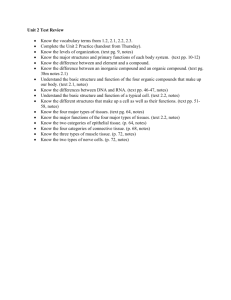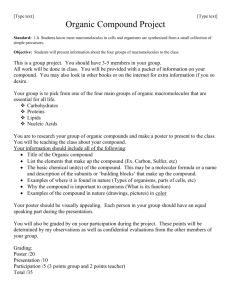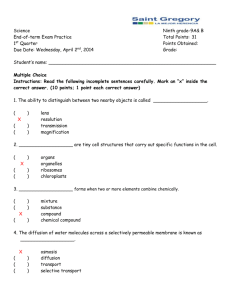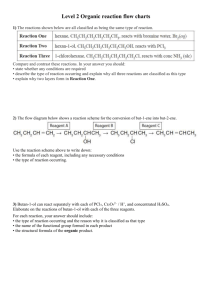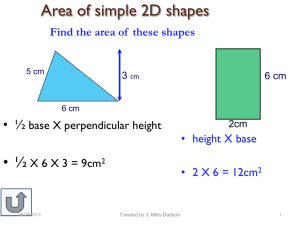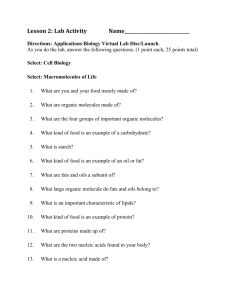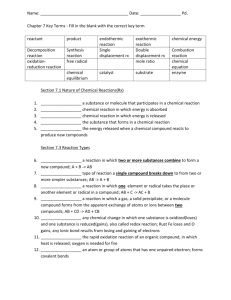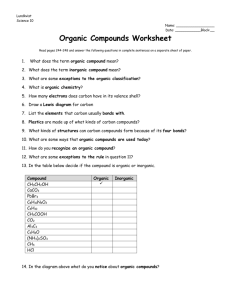File
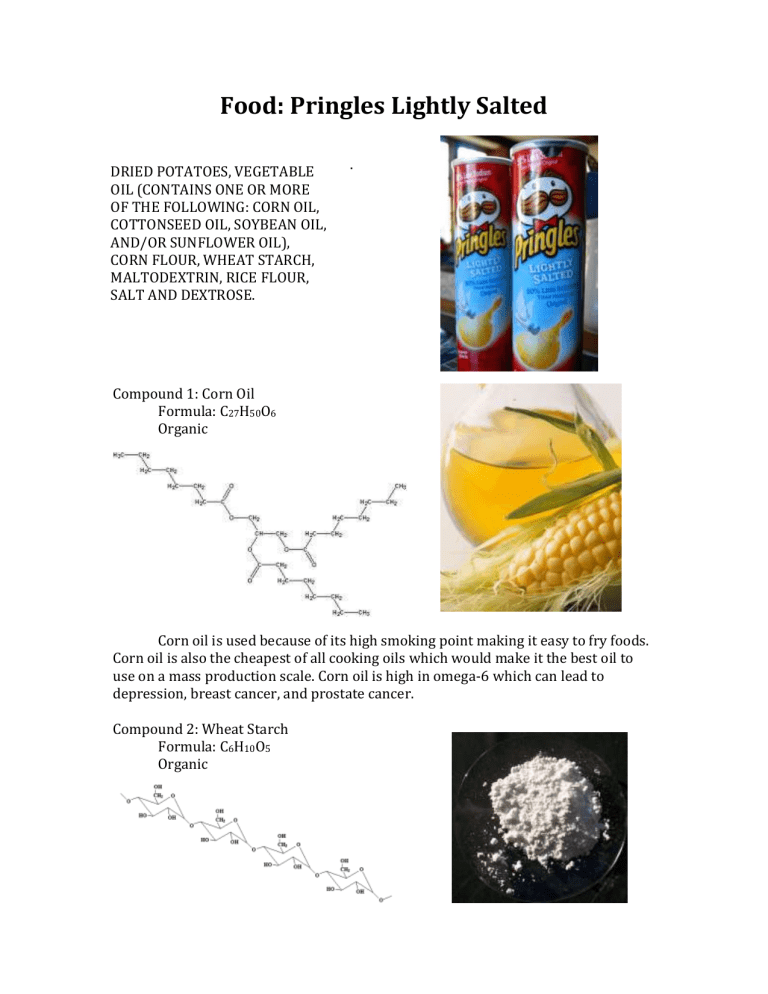
Food: Pringles Lightly Salted
DRIED POTATOES, VEGETABLE
OIL (CONTAINS ONE OR MORE
OF THE FOLLOWING: CORN OIL,
COTTONSEED OIL, SOYBEAN OIL,
AND/OR SUNFLOWER OIL),
CORN FLOUR, WHEAT STARCH,
MALTODEXTRIN, RICE FLOUR,
SALT AND DEXTROSE.
.
Compound 1: Corn Oil
Formula: C
27
H
50
O
6
Organic
Corn oil is used because of its high smoking point making it easy to fry foods.
Corn oil is also the cheapest of all cooking oils which would make it the best oil to use on a mass production scale. Corn oil is high in omega-6 which can lead to depression, breast cancer, and prostate cancer.
Compound 2: Wheat Starch
Formula: C
6
H
10
O
5
Organic
Wheat starch was also used by the Egyptians as glue, Romans used it as cosmetic products, and Indians used it to making dishes. 40% of wheat starch is used in the US for industrial use and 60% for food.
Compound 3: Maltodextrin
Formula: C
6n
H
(10n+2)
O
(5n+1)
Organic
Maltodextrin is derived from almost any starch through hydrolysis. It is easily digestible and is also easily absorbed. It is one of the most used ingredients in processed foods.
Compound 4: Dextrose
Formula: C
6
H
12
O
6
Organic
Dextrose is absorbed into the bloodstream during digestion. Dextrose is found in plants due to photosynthesis. Dextrose is also known as Glucose and the name dextrose is actually misleading.
Compound 5: Salt
Formula: NaCl
Inorganic
Table salt is something you see in every house, it has been used since ancient times. Salt is a necessity to life and is a basic seasoning that can be applied to almost anything.
Medicine: Mucinex DM
Dextromethorphan HBr, Guaifenesin, carbomer
Homopolymer, aluminum lake, hypromellose,
Magnesium stearate, microcrystalline cellulose,
Sodium starch glycolate
Compound 1: Dextromethorphan HBr
Formula: C
18
H
25
NO•HBr
Organic
Dextromethorphan is a cough suppressant used in many over the counter medicines, it can also be used as a pain reliever.
Compound 2: Guaifenesin
Formula: C
10
H
14
O
4
Organic
Guaifenesin is used to help bring up the phlegm from clogged airways. Similar compounds from the same tree were used by Native Americans for remedy use.
Compound 3: Hypromellose
Hypromellose is an inactive ingredient in this medicine. This is a lubricant which is put on the outside shell of pills to help the pill go down without much trouble.
Depending on specific formation can be
Organic or inorganic.
Compound 4: Magnesium Stearate
Formula: Mg(C
18
H
35
O
2
)
2
Organic
Magnesium Stearate is not soluble in water.
In this case the magnesium stearate is used as a lubricant not for consumption but so it will not stick to manufacturing tools.
Compound 5: Microcrystalline Cellulose
Formula: C
6
H
10
O
5
Organic
Microcrystalline Cellulose is the fibers of ground-up plants. It adds texture and is
Insoluble in water, ethanol, ether, and dilute mineral acids.
Cleaning Product: Colgate Optic White
Active Ingredients: Sodium Monofluorophosphate (0.76%) (0.15% w/v Fluoride
Ion). Inactive Ingredients: Calcium Pyrophosphate, Propylene Glycol, PEG/PPG
116/66 Copolymer, PEG-12, Glycerin, PVP, Flavor, Sodium Lauryl Sulfate,
Tetrasodium Pyrophosphate, Silica, Hydrogen Peroxide, Sodium Saccharin,
Phosphoric Acid, Sucralose, Butylated Hydroxytoluene, Water.
Compound 1: Sodium Monoflourophosphate
Formula: Na
Inorganic
2
PFO
3
Like most salts, sodium monoflourophosphate is odorless, white, and water soluble. This salt claims to protect the enamel from bacteria.
Compound 2: Calcium Pyrophosphate
Formula: Ca
Inorganic
2
O
7
P
2
This is formed by a reaction between
Calcium and pyrophosphoric acid. It is a cleaning agent that takes off plaque
Compound 3: Propylene Glycol
Formula: C
Organic
3
H
8
O
2
PG is a colorless and semi sweet oil like substance used for sweetening the toothpaste.
Compound 4: Glycerin
Formula: C
3
H
8
O
3
Organic
Much like propylene glycol it is a colorless and semi sweet oil like substance that sweetens the toothpaste.
Compound 5: Hydrogen Peroxide
Formula: 2(HO)
Inorganic
In toothpaste, hydrogen peroxide is used as a whitening and cleaning agent.
Through this assignment I have grown aware of all the compounds and chemicals around me. I have learned that they range from the simplest to extremely complex compounds that go into everyday items that I use. I also learned the reasons that such chemicals and ingredients are put into said items. It was interesting to learn that hydrogen peroxide is used in toothpastes. Also in some items, compounds that are very similar are put into the same product because of the same properties such as glycerol and propylene glycol have a difference of one oxygen atom.
References:
En.Wikipedia.org
